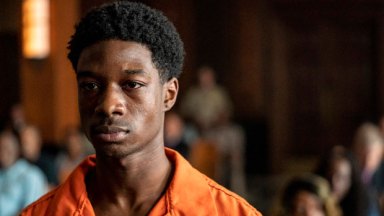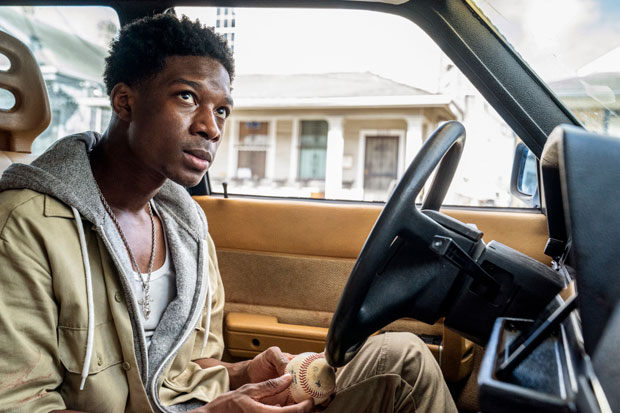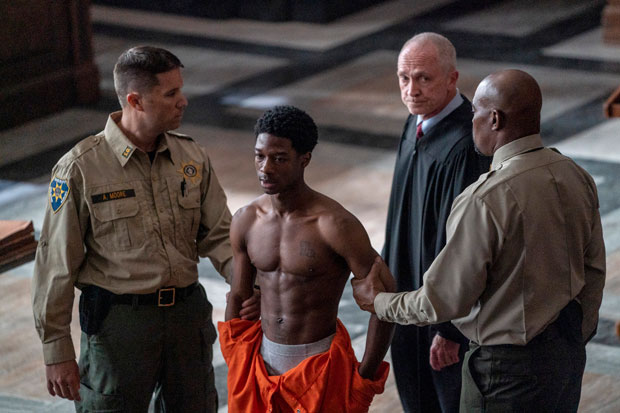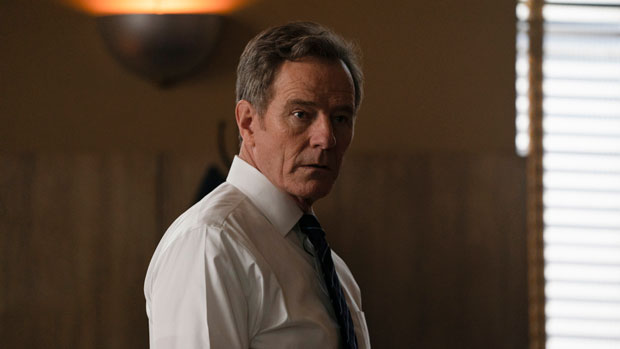
Michael Desiato’s determination to save his son continued in the Dec. 16 episode of Your Honor, and now another life has been forever impacted by Adam’s decision to leave the scene after he accidentally hit and killed Rocco Baxter with his car. When Michael asked Charlie to get rid of Robin’s car that hit Rocco, Kofi Jones was the one to take the job. This chain of events ended with Kofi going down for Rocco’s death.
Kofi was cruelly mistreated by the New Orleans police, and one corrupt cop put a bound Kofi in a car that he filled with gas in order to get Kofi to talk. Lamar Johnson was tremendous as Kofi’s life changed before his eyes. HollywoodLife talked EXCLUSIVELY with Lamar about how he prepared for the intense scenes in the second episode, whether Kofi has any hope the truth will come out, and the thought process behind Kofi pleading guilty to a crime he didn’t commit.

Why were you drawn to this role?
Lamar Johnson: I think ultimately what drew me to this project was the script, as it drew everybody to the project. I just thought that the script was just very compelling and very smart. Obviously, Bryan Cranston being a part of the show, he’s a legend. With this character, when I first got the audition I didn’t necessarily know Kofi’s arc. It was more so thing where I just saw him in the Lower Ninth, and I saw him in the police station with a bit of gravitas to him. I remember having a conversation with the casting director and saying I’m not too sure about this role because I feel like it’s just quite one dimensional and so on and so forth. She really compelled me. She was like, Lamar, trust me. This role is really great. He has a great arc, and it’s a great role for an actor. I read the script, and she sent me a callback scene between me and Kofi’s mom that gave me chills. So not only is the writing great, but also the scenes that I get to work on and be a part of and really kind of carve out and make real were there. Once I started reading the entire arc I think at the end of the day what drew me to this role was really just about the work and how much I would get to stretch myself to get to the places that Kofi goes to. I personally don’t have any personal experiences that typically mirror what he goes through and what he does. So it was more so about the experience and the challenge for me to step into that, for me to stretch myself as an actor, allow myself to be vulnerable, allow myself to have things happen to me, and react to what’s around me in my environment. I think it was actually quite powerful to do, and it really gave me a lot of self-confidence about my depth and my range as an actor because I’ve never had to get there before. I’m really proud of the fact that I had a great team and some great supporters on set to help and allow me to get there.
Kofi is arrested and framed for what happened to Rocco. Everything happens so fast for Kofi. One minute he’s on the job, the next he’s in jail for something he didn’t do. Do you think Kofi is starting to question what’s happened to him?
Lamar Johnson: Absolutely. There are definitely moments where Kofi’s sitting there being like, how could this happen to me? I don’t think it truly hits him until he ends up in jail, and he’s truly in that circumstance after already pleading guilty. Those moments when he’s in jail — not even by himself — because he shares a cell but the experience he has is a lot for him. I think for Kofi, even though the decision wasn’t his, it was his if that makes sense. He ultimately did make that decision, he said that he was guilty, he knew the cards that were on the table for him, he knew what was stacked up against him. But ultimately, he made the decision for his family, and not for himself. He did something that was even bigger than him, and I think that is extremely honorable. It takes a lot of strength to have your back completely against the wall. In those moments, for you to truly still step up and be selfless in that decision, I think it’s wild. I think that’s also another reason why I was drawn to the character. I also think that the show and the subject matter that it touches on is quite timely. It’s a reflection of the world that we’re living in right now with privilege and race and class. I think that the show just does a great way of marrying all these timely issues that we’re experiencing and dealing with in this current moment and showing it through a lens like Michael’s or Adam’s. There’s a lot of people like Kofi that don’t necessarily have the resources or the information or the knowledge to then actually get themselves out of a situation like this. Even with Michael Stuhlbarg’s character, you’re really just seeing the access that they have. All the while, Kofi actually is innocent. There are so many dualities to so many things. I think this show makes you think. It provokes thoughts and provokes feelings. I think the fact that this show can keep you on the edge of your seat and make you feel something, that’s great storytelling. That’s great art.
To go off your point about how timely this is, the scene when Kofi is arrested is a situation we’ve seen come up countless times in the media between Black men and the police. When I was preparing for this interview, I noted that Adam would never have experienced what Kofi did because Adam is a White man living in America.
Lamar Johnson: Absolutely not. Even when you look at Michael, he was parked up at the bridge and throwing the evidence into the water. The cop stops him and he just unzips his zipper and starts peeing. He says he has a bad prostate, and the cop just walks away. There’s no way that if a Black man or even Kofi was doing that, that he would get off like that. So that is also something that was quite apparent with privilege that the show really speaks on. When you’re watching Kofi go through what he goes through in the car, they come back to Adam at home relaxing and taking a puffer. While Kofi actually can’t breathe, Adam is at home chilling, taking his puffer. I love that this show doesn’t necessarily hold back on specific topics. I think it’s done in a way that, once again, will make you feel something. I think it should. I just love to be a part of projects that are not only timely and create impact, but something that provokes thought and makes you feel something.

It’s devastating and frustrating to watch Kofi and Adam’s trajectories and seeing how Adam’s decisions have changed both of their lives. Kofi’s interrogation scene was so difficult to watch. How did you prepare for that scene?
Lamar Johnson: I sort of knew that scene was going to come up at some point during filming. I was just foreshadowing that scene as soon as I came to New Orleans. To me, that was Kofi’s big scene just because it was the most vulnerable that I’ve ever had to be. So it was sort of a thing for me where I couldn’t wait, but I was also so nervous because you just don’t know how it’s going to go. Beforehand, it was about doing my homework, asking questions, watching videos, reading things, and just hoping that homework and those questions and information could live in my body and just be present, given the environment. It was very nerve-wracking. And I would say it was difficult. There were even moments where I blacked out when I was doing that scene just because of how far I went and allowed myself to go. Even though it’s hard to watch, for me as an actor, it was quite liberating to me in a way because it just showed me my access. The character of Kofi really showed me myself, which is crazy to think about. This experience has just been a crazy cathartic thing for me as well. I did end up getting sick because I think that scene was shot on a Friday and by Saturday I was in bed. I was just super drained. A lot of the time as an artist, that’s sort of the sacrifice that you have to make for the work sometimes because these things live forever. I would hate to feel in my body that I didn’t give it all that I could in that moment, so I allowed myself to go there. I think it was so worth it now that I’m thinking back at it.
One thing that really stood out to me was during that car scene Kofi gasping for air was very similar to Rocco gasping for air in his final moments. There’s so much incredible imagery there, especially with the car. Later in court, Kofi pleads guilty after he’s told that his family will be taken care of if he does. By the end of the episode, do you think Kofi sees a way out of this? Does he see a future where the truth will come out?
Lamar Johnson: I feel like Kofi is very much a realist, but there is still hope for him. I think he still holds on to his hope. I think he has that type of heart. Just the fact that he made such a selfless decision, that he’s willing to sacrifice his freedom and livelihood for his own family shows what type of heart he has. I think, ultimately, he knows what he’s stepping into. He knows what his life may look like, but I think he feels security in the fact that he does have a brotherhood with the Desire crew. So at least when he is in jail, he thinks he knows he’s going to be taken care of. He’s going to have some older people there that will look out for him. He’s not there completely by himself, so there is a bit of hope in that idea. But he does ultimately know his future. He knows what that’s going to look like. He knows he’s going to be in jail, and there’s probably not going to be any way out. He knows that there’s probably going to be people after him now knowing after he said he was guilty of killing Rocco. I think there is a glimmer of hope with him, especially with the Lee Delamere character. But he knows that he has to be the bigger person for his mother and his siblings. He’s been the father figure for his younger siblings. He’s the one that is on the street all day making the money so he can bring home food. The decision that he made was bigger than him. It’s not just him, it’s now his mom and his siblings. He would much rather sacrifice himself than sacrifice the security and safety of his own family.

It’s all so tragic and interconnected. Michael even comes across Kofi’s brother in the opening moments of the series.
Lamar Johnson: It’s really crazy that you mentioned that. That was a huge foreshadowing moment in the entire show. The thing is, in that scene, Bryan is actually the good person. It’s really crazy to see how that shifts and how he makes that transition. I think Bryan is so brilliant that way because he just does such a fantastic job at showing himself in a way that is so subtle but so good. The audience, at times, knows more things than the characters do. The way Bryan is able to play it is so brilliant. It was honestly an honor, no pun intended, to work with Bryan and the cast. Edward [Berger], our director for the first batch of episodes, was fantastic. He was just such a great collaborator, especially with Kofi and the scenes that I had to do. He allowed the space and room for me to play. It was just such an excellent and positive experience for me.
Without giving too much away, what can you tease about what’s next for Kofi?
Lamar Johnson: He will see the hierarchy in the judicial system and how he’s positioned in that world. I think that is big. You’re really gonna see how he’s positioned in that world and how he navigates that and what that looks like for him now being in jail and not really knowing anyone.


